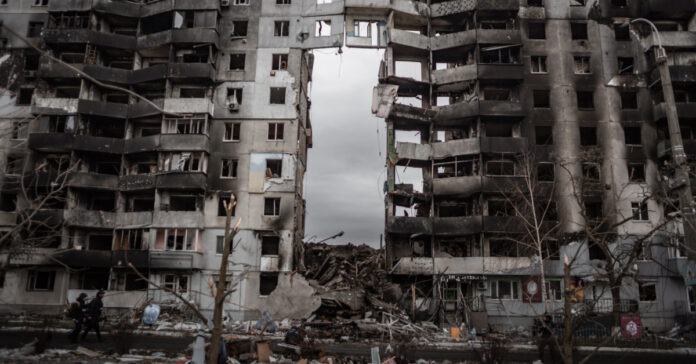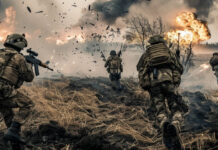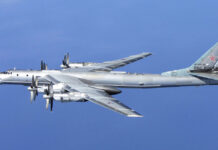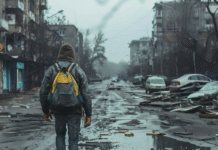While the American news media focused on the debt ceiling and possible default, the likelihood of war in Europe was growing.
Ok, maybe it wasn’t the debt ceiling. Perhaps everyone was paying attention to the latest viral TikTok or YouTube video, the NBA playoffs, the Budweiser boycott and the Target Pride clothing thing instead of the war. Of course, it could have been all the presidential candidate announcements, or Trump being found guilty at his recent trial. Maybe mass shootings in the U.S. seem more pressing than soldiers and citizens dying in Ukraine.
In any case, the Ukraine war has fallen from public view. No one seems worried about it any longer, and I think that includes a fair number of preppers. Perhaps we are all facing some burnout when it comes to the Ukraine war, the fall of Bahkmut, and the long awaited counter offensive.
This distraction from what should be a big news story is intentional. The government would prefer you ignore the meeting NATO has scheduled in Lithuania to discuss a plan for war with Russia. They don’t think about war with Russia because you might worry too much. It might send the market down, harm the economy, and hurt Biden’s chances at re-election.
Signs of War
Instead of listening to what the government says, I look at what they do. All around the world, governments and the elites are preparing for war. Senators are being issued satellite phones for emergency use. The rich are building private bunkers. The Russians are opening bomb shelters, as are multiple countries across Europe. These same countries are installing advanced surface-to-air missile systems, buying new weapons, and building their armies. Taiwan is doing the same.
In the Pacific, the U.S. is expanding its military bases and identifying places where it can base aircraft if China bombs our main bases in Guam and Okinawa. Parts of the plan read like the WWII campaign against Japan, with the Marines using helicopters and VTOL aircraft instead of landing craft. I wonder if we’ll see Seabees building landing strips again?
If China attacks the U.S. as an opening salvo in its Taiwan invasion, which our war planners expect, it will have to strike air bases and ports in Japan, the Philippines, Australia, South Korea and possibly a few other nations. That sounds like a world war.
Elsewhere, the Taliban in Afghanistan says it wants to conquer Iran and is using weapons left behind when the U.S. withdrew to attack Iran. (You gotta love the irony.) There has already been a small cross-border incursion that left several dead. Israel is another hot spot in the Middle East and war could break out between Iran and Israel at any moment. It wouldn’t surprise me if Israel were to strike Iranian nuclear assets when Iran is distracted by the Taliban.
The situation with Serbians in Kosovo is also heating up. There are NATO peace keepers there, but they have been able to do little to stem the tide of violence.
Prep for War
While few are talking about it publicly, the rising tensions seem similar to those prior to WWI and WWII. War may be inevitable. The big question is, will it stay conventional or will someone let the nuclear genie out of the bottle? I am trying to prepare for both. Thankfully, the preparations overlap.
I don’t think a conventional war would see an invasion in the U.S., but there could be sleeper cells that target strategic objectives and use terrorism to hurt our morale. “If you see something, say something” would come back into vogue and the government will probably start targeting people by ethnicity again.
In the event of a world war or other large-scale conflict involving the U.S., preppers should be prepared for severe economic problems leading to belt tightening, shortages and rationing.
Worse, I think the government will use a war as an excuse to further crack down on our freedoms. We will see excessive government control, including price freezes, limits on what you can buy, curfews and martial law, restrictions on travel, and censorship well beyond what we experience today. The government could also seize control of the Internet under the guise of “national security.” If you think the government has weaponized the FBI and IRS, just wait until they have a war as an excuse to crack down on anyone who disagrees with them.
How do you prepare for that? Keep a low profile and be the Gray Man. Stay off their radar (and off social media.) As for shortages and economic problems, that’s why we are stockpiling food and other goods. Use the shortages we saw during the lockdown as a guide as we may see similar shortages if war disrupts trade in the Pacific.
A Space War
The next war could be the first war fought in space. That means they could blow up satellites. If so, we’ll see less global communications, fewer talking heads and live news, and no GPS service. (If you rely on GPS, better get some maps.)
A space war might involve things we’ve only seen in the movies. We just have to hope anything that falls from space burns up on re-entry and isn’t a threat to us on the ground.
Nuclear War
If a nuclear war were to breakout, there would be all of the above plus fallout. There may also be lots of death and destruction, especially in key strategic areas and large cities. A nuclear war is not a good time to live near an important military base or even a large port.
If you live in a target area, your best bet is to not be there when the bombs hit. That could mean moving elsewhere beforehand so you are no longer in the target zone. It could also mean bugging out before the bombs hit. Good luck with the timing of that.
Other than building a shelter of some sort to protect you from radiation, those of us who are not killed in the initial blasts have to worry about living in a country that has suffered severe devastation and destruction. A nuclear attack of any significant size will damage much of the infrastructure, manufacturing, and other systems that have kept us at the height of civilization. That could be further complicated by a world covered with radioactive fallout and nuclear winter, even in places far from the war zone. Even countries not targeted will be cut off from their markets, the global finance system, oil, and food supplies. Life will be upended in all but the worst of the third world countries.
Live Like it’s the 1880
I’ve said before that living in a post-nuclear world or after an EMP attack would be akin to waking up in the 1880s. You suddenly have no electricity or Internet; there are no planes, cars, or trucks; no refrigeration or air conditioning; and no advanced medicine or dentistry. You’d live in a world where a horse is the best means of transportation, yet very few have horses; where some train tracks would remain usable, but there are few steam engines available to pull trains. Survivors would know that all these wonderful things are possible, but have no idea of how to build, or rebuild, them.
If you survive the immediate aftermath, the fallout and the golden hordes, the starvation and the freezing temperatures, the war parties and gangs, then the hard part begins: surviving the next six to ten years with little or no outside support.
When you get right down to it, that is what we should all prep for, and good luck to us all.







